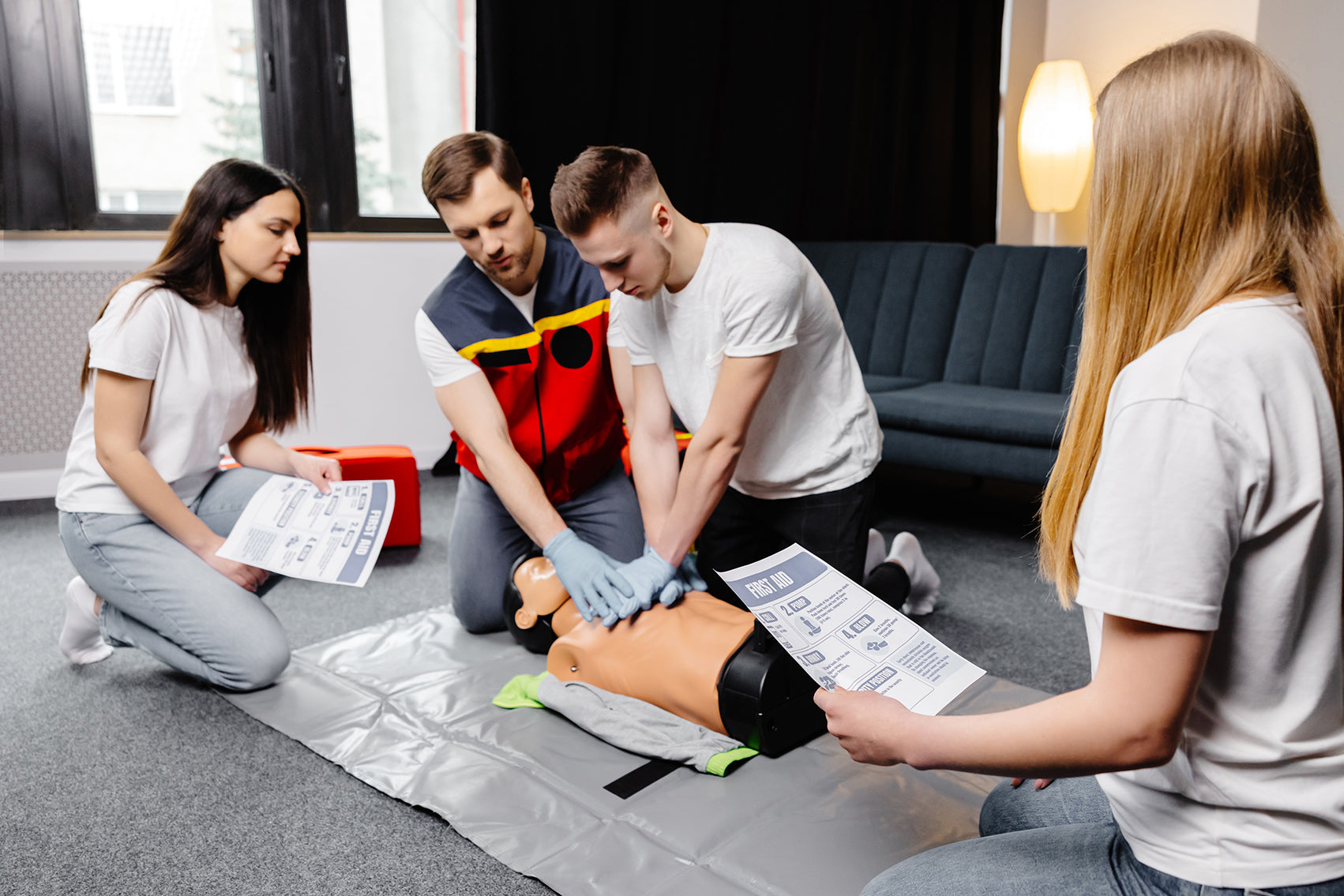You have no items in your shopping basket.
Importance of BLS training for healthcare providers
The critical need for practical BLS, CPR & AED refresher courses for healthcare professionals - Enhancing emergency preparedness
Dr Richard Dune
18-11-2024
Responding swiftly and effectively to life-threatening situations is non-negotiable in healthcare settings. Basic Life Support (BLS), Cardiopulmonary Resuscitation (CPR), and Automated External Defibrillator (AED) training are indispensable skills that all healthcare professionals must master. Regular refresher courses ensure these life-saving competencies remain sharp, aligning with guidance from leading regulatory bodies such as the Resuscitation Council UK (RCUK), the Care Quality Commission (CQC), and the Skills for Health Core Skills Training Framework (CSTF).
Why regular BLS, CPR, & AED refresher training matters
Every second is critical during a medical emergency. According to the RCUK, effective resuscitation can double or triple survival rates following cardiac arrest. However, even experienced professionals experience skill decay without regular practice. Refresher BLS, CPR, and AED training ensure healthcare staff maintain proficiency, readiness, and compliance with regulatory standards.
Click here to book practical refresher BLS and AED training courses.

Image by LightFieldStudios via Envato Elements

Image by iLixe48 via Envato Elements
Key audiences for BLS, CPR & AED training
Refresher courses are relevant across healthcare roles, including:
- Doctors, nurses, and dentists - Especially those in critical care or high-stakes environments.
- Allied Health Professionals (AHPs) - Paramedics, physiotherapists, and radiographers.
- Primary care and support staff - General practitioners, pharmacists, and healthcare assistants.
- Paediatric and infant care providers - Those working with children must master child-specific resuscitation techniques.
Click here to book BLS, AED & CPR courses for healthcare professionals.
Core components of high-quality refresher courses
Effective BLS and AED refresher courses should cover practical and theoretical aspects to enhance confidence and competency.
- Primary survey and scene safety - Assessing the environment for safety and determining immediate patient needs.
- Resuscitation techniques for all ages - Tailored protocols for adults, children, and infants.
- AED usage - Device operation, pad placement, and practical simulations.
- ABCDE approach - Systematic assessment of airway, breathing, circulation, disability, and exposure.
- Team communication and roles - Emphasising coordination and clear communication in emergencies.

Image by iLixe48 via Envato Elements

Image by ijeab via Envato Elements
Regulatory compliance and certification
Refresher resuscitation training is a regulatory requirement, ensuring healthcare providers meet critical standards:
- RCUK - Annual BLS and AED training are recommended for all healthcare professionals.
- CQC - Mandates competency in emergency response as part of essential standards.
- CSTF - Recommends annual training for clinical and non-clinical staff.
- Professional regulatory bodies - GMC, NMC, and HCPC require ongoing CPR and BLS competence.
The impact on patient outcomes
Research confirms that timely and confident application of BLS, CPR, and AED skills significantly improves survival rates. Regular BLS refresher training ensures healthcare teams act decisively, minimising delays during emergencies and fostering a culture of readiness.

Image by LightFieldStudios via Envato Elements

Image by iLixe48 via Envato Elements
Customising training for different healthcare settings
Refresher BLS courses can be tailored to meet the unique demands of various environments:
- Hospitals - BLS, Immediate Life Support (ILS) and Advanced Life Support (ALS) for acute care settings.
- Primary care - BLS and AED protocols for clinics and GP surgeries.
- Community and home care - Training for portable AED use and CPR in less controlled environments.
Blended learning - Flexible training solutions
Blended learning combines online BLS and life support modules with hands-on practical CPR and AED sessions, offering flexibility without compromising competency. Virtual simulations, interactive quizzes, and e-certifications streamline compliance tracking and skill reinforcement.

Image by raferto1973 via Envato Elements

Image by YuriArcursPeopleimages via Envato Elements
Building a culture of preparedness
Beyond regulatory requirements, regular BLS, CPR, and AED training fosters a proactive approach to patient safety. A well-trained workforce is confident, coordinated, and prepared to handle emergencies, creating a safer healthcare environment for all.
Enhance your resuscitation skills today
Stay compliant and confident with our online and classroom BLS, CPR & AED training courses. Explore our online basic life support courses, practical resuscitation training bookings, or CPD-accredited statutory and mandatory training programmes. Equip your team with life-saving skills and ensure you're always prepared to make a difference. Enrol now to a practical BLS course and prioritise patient safety!
Responding swiftly and effectively to life-threatening situations is non-negotiable in healthcare settings. Basic Life Support (BLS), Cardiopulmonary Resuscitation (CPR), and Automated External Defibrillator (AED) training are indispensable skills that all healthcare professionals must master. Regular refresher courses ensure these life-saving competencies remain sharp, aligning with guidance from leading regulatory bodies such as the Resuscitation Council UK (RCUK), the Care Quality Commission (CQC), and the Skills for Health Core Skills Training Framework (CSTF).
Why regular BLS, CPR, & AED refresher training matters

Image by LightFieldStudios via Envato Elements
Every second is critical during a medical emergency. According to the RCUK, effective resuscitation can double or triple survival rates following cardiac arrest. However, even experienced professionals experience skill decay without regular practice. Refresher BLS, CPR, and AED training ensure healthcare staff maintain proficiency, readiness, and compliance with regulatory standards.
Click here to book practical refresher BLS and AED training courses.
Key audiences for BLS, CPR & AED training

Image by iLixe48 via Envato Elements
Refresher courses are relevant across healthcare roles, including:
- Doctors, nurses, and dentists - Especially those in critical care or high-stakes environments.
- Allied Health Professionals (AHPs) - Paramedics, physiotherapists, and radiographers.
- Primary care and support staff - General practitioners, pharmacists, and healthcare assistants.
- Paediatric and infant care providers - Those working with children must master child-specific resuscitation techniques.
Click here to book BLS, AED & CPR courses for healthcare professionals.
Core components of high-quality refresher courses

Image by iLixe48 via Envato Elements
Effective BLS and AED refresher courses should cover practical and theoretical aspects to enhance confidence and competency.
- Primary survey and scene safety - Assessing the environment for safety and determining immediate patient needs.
- Resuscitation techniques for all ages - Tailored protocols for adults, children, and infants.
- AED usage - Device operation, pad placement, and practical simulations.
- ABCDE approach - Systematic assessment of airway, breathing, circulation, disability, and exposure.
- Team communication and roles - Emphasising coordination and clear communication in emergencies.
Regulatory compliance and certification

Image by ijeab via Envato Elements
Refresher resuscitation training is a regulatory requirement, ensuring healthcare providers meet critical standards:
- RCUK - Annual BLS and AED training are recommended for all healthcare professionals.
- CQC - Mandates competency in emergency response as part of essential standards.
- CSTF - Recommends annual training for clinical and non-clinical staff.
- Professional regulatory bodies - GMC, NMC, and HCPC require ongoing CPR and BLS competence.
The impact on patient outcomes

Image by LightFieldStudios via Envato Elements
Research confirms that timely and confident application of BLS, CPR, and AED skills significantly improves survival rates. Regular BLS refresher training ensures healthcare teams act decisively, minimising delays during emergencies and fostering a culture of readiness.
Customising training for different healthcare settings

Image by iLixe48 via Envato Elements
Refresher BLS courses can be tailored to meet the unique demands of various environments:
- Hospitals - BLS, Immediate Life Support (ILS) and Advanced Life Support (ALS) for acute care settings.
- Primary care - BLS and AED protocols for clinics and GP surgeries.
- Community and home care - Training for portable AED use and CPR in less controlled environments.
Blended learning - Flexible training solutions

Image by raferto1973 via Envato Elements
Blended learning combines online BLS and life support modules with hands-on practical CPR and AED sessions, offering flexibility without compromising competency. Virtual simulations, interactive quizzes, and e-certifications streamline compliance tracking and skill reinforcement.
Building a culture of preparedness

Image by YuriArcursPeopleimages via Envato Elements
Beyond regulatory requirements, regular BLS, CPR, and AED training fosters a proactive approach to patient safety. A well-trained workforce is confident, coordinated, and prepared to handle emergencies, creating a safer healthcare environment for all.
Enhance your resuscitation skills today
Stay compliant and confident with our online and classroom BLS, CPR & AED training courses. Explore our online basic life support courses, practical resuscitation training bookings, or CPD-accredited statutory and mandatory training programmes. Equip your team with life-saving skills and ensure you're always prepared to make a difference. Enrol now to a practical BLS course and prioritise patient safety!
About the author
Dr Richard Dune

With over 20 years of experience, Richard blends a rich background in NHS, the private sector, academia, and research settings. His forte lies in clinical R&D, advancing healthcare tech, workforce development and governance. His leadership ensures regulatory compliance and innovation align seamlessly.
About the author
Dr Richard Dune
With over 20 years of experience, Richard blends a rich background in NHS, the private sector, academia, and research settings. His forte lies in clinical R&D, advancing healthcare tech, workforce development and governance. His leadership ensures regulatory compliance and innovation align seamlessly.

About the author
Dr Richard Dune
With over 20 years of experience, Richard blends a rich background in NHS, the private sector, academia, and research settings. His forte lies in clinical R&D, advancing healthcare tech, workforce development and governance. His leadership ensures regulatory compliance and innovation align seamlessly.

Related blog articles
View allContact us
Complete the form below to start your ComplyPlus trial and transform your regulatory compliance solutions.







